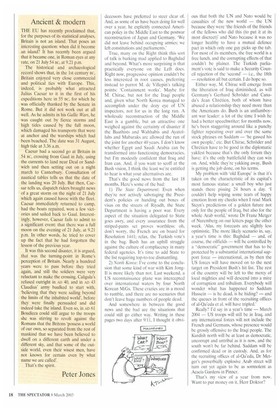Ancient & modern
THE EU has recently proclaimed that, for the purposes of its statistical analyses, Britain is not an island. That poses an interesting question: when did it become an island? It has recently been argued that it became one, in Roman eyes at any rate, on 21 July 54 BC, at 9.21 p.m.
The historical and archaeological record shows that, in the 1st century Eic, Britain enjoyed very close commercial and political ties with Europe. This, indeed, is probably what attracted Julius Caesar to it in the first of his expeditions here in 55 BC, for which he was officially thanked by the Senate in Rome. But it did not work out at all well. As he admits in his Gallic Wars, he was caught out by fierce storms and high tides caused by the full moon, which damaged his transports that were at anchor and the warships which had been beached. The date was 31 August, high tide at 3.36 a.m.
Caesar had a second go at Britain in 54 BC, crossing from Gaul in July, using the currents to land near Deal or Sandwich and then setting out on a night march to Canterbury. Consultation of nautical tables tells us that the date of the landing was 20 July. But then, Caesar tells us, dispatch riders brought news of a great storm on the night of 21 July which again caused havoc with the fleet. Caesar immediately returned to camp, had the boats repaired, won a few victories and sailed back to Gaul. Interestingly, however, Caesar fails to admit to a significant event: that there was a full moon on the evening of 21 July, at 9.21 p.m. In other words, he tried to cover up the fact that he had forgotten the lesson of the previous year.
It was this second disaster, it is argued, that was the turning-point in Rome's perception of Britain. Nearly a hundred years were to pass before they tried again, and still the soldiers were very reluctant to make the crossing. Caligula's refused outright in AD 40, and in AD 43 Claudius' army baulked to start with, 'believing that they were sailing beyond the limits of the inhabited world', before they were finally persuaded and did indeed take the island. Even so, in AD 61 Boudicca could still argue to the troops she was stirring to revolt against the Romans that the Britons 'possess a world of our own, so separated from the rest of mankind that we have been believed to dwell on a different earth and under a different sky, and that some of the outside world, even their wisest men, have not known for certain even by what name we are called'.
That's the spirit.
Peter Jones


































































 Previous page
Previous page